-
71 results in Exploration of Digestive DiseasesSort byMost Cited
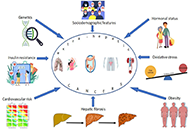 Extra-hepatic cancers in metabolic fatty liver syndromesOpen AccessEditorialAmedeo LonardoPublished: February 24, 2023 Explor Dig Dis. 2023;2:11–17
Extra-hepatic cancers in metabolic fatty liver syndromesOpen AccessEditorialAmedeo LonardoPublished: February 24, 2023 Explor Dig Dis. 2023;2:11–17
DOI: https://doi.org/10.37349/edd.2023.00014 Helicobacter pylori and gastric cancer: a critical approach to who really needs eradicationOpen AccessReviewIt is generally accepted that eradication of Helicobacter pylori (H. pylori) infection may reduce the risk of the development of gastric cancer. Recommendations for global generalized tests and trea [...] Read more.Elias Kouroumalis ... Argyro VoumvourakiPublished: April 16, 2024 Explor Dig Dis. 2024;3:107–142
Helicobacter pylori and gastric cancer: a critical approach to who really needs eradicationOpen AccessReviewIt is generally accepted that eradication of Helicobacter pylori (H. pylori) infection may reduce the risk of the development of gastric cancer. Recommendations for global generalized tests and trea [...] Read more.Elias Kouroumalis ... Argyro VoumvourakiPublished: April 16, 2024 Explor Dig Dis. 2024;3:107–142
DOI: https://doi.org/10.37349/edd.2024.00043
This article belongs to the special issue Helicobacter Pylori and Infection: Genomics, Diagnosis, Pathogenesis, Antibiotic Resistance, Microbiota, Cancer, Prevention and Therapeutics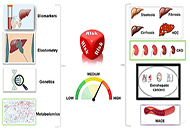 Principles of risk stratification in nonalcoholic fatty liver disease. A narrative review emphasizing non-invasive strategiesOpen AccessReviewNonalcoholic fatty liver disease (NAFLD) is an umbrella definition that describes the ectopic deposition of fat within the liver that occurs in the absence of inciting factors other than the metabol [...] Read more.Amedeo LonardoPublished: August 30, 2023 Explor Dig Dis. 2023;2:188–201
Principles of risk stratification in nonalcoholic fatty liver disease. A narrative review emphasizing non-invasive strategiesOpen AccessReviewNonalcoholic fatty liver disease (NAFLD) is an umbrella definition that describes the ectopic deposition of fat within the liver that occurs in the absence of inciting factors other than the metabol [...] Read more.Amedeo LonardoPublished: August 30, 2023 Explor Dig Dis. 2023;2:188–201
DOI: https://doi.org/10.37349/edd.2023.00026
This article belongs to the special issue Advances in Hepato-gastroenterology: Diagnosis, Prognostication, and Disease Stratification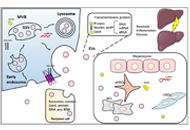 Extracellular vesicles in metabolic dysfunction associated fatty liver disease: mechanisms, diagnostic and therapeutic implicationsOpen AccessReviewThe prevalence of metabolic dysfunction-associated fatty liver disease (MAFLD) is increasing rapidly worldwide due to the obesity epidemic. Advanced stages of the MAFLD, such as non-alcoholic steato [...] Read more.Zongmei Wu ... Han MoshagePublished: July 13, 2022 Explor Dig Dis. 2022;1:4–20
Extracellular vesicles in metabolic dysfunction associated fatty liver disease: mechanisms, diagnostic and therapeutic implicationsOpen AccessReviewThe prevalence of metabolic dysfunction-associated fatty liver disease (MAFLD) is increasing rapidly worldwide due to the obesity epidemic. Advanced stages of the MAFLD, such as non-alcoholic steato [...] Read more.Zongmei Wu ... Han MoshagePublished: July 13, 2022 Explor Dig Dis. 2022;1:4–20
DOI: https://doi.org/10.37349/edd.2022.00002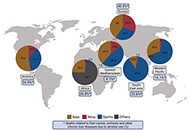 Alcohol-related liver disease: also a question of what you drink?Open AccessReviewExcessive alcohol intake is still among the leading causes of chronic liver diseases. Epidemiological studies suggest that per capita consumption of alcohol from various alcohol beverages e.g., beer [...] Read more.Finn Jung ... Ina BergheimPublished: June 30, 2023 Explor Dig Dis. 2023;2:118–132
Alcohol-related liver disease: also a question of what you drink?Open AccessReviewExcessive alcohol intake is still among the leading causes of chronic liver diseases. Epidemiological studies suggest that per capita consumption of alcohol from various alcohol beverages e.g., beer [...] Read more.Finn Jung ... Ina BergheimPublished: June 30, 2023 Explor Dig Dis. 2023;2:118–132
DOI: https://doi.org/10.37349/edd.2023.00022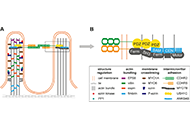 The intermicrovillar adhesion complex in gut barrier function and inflammationOpen AccessPerspectiveThe surface of intestinal epithelial cells is covered by the brush border, which consists of densely packed cellular extrusions called microvilli. Until recently, microvilli have not been known to b [...] Read more.Bernadette Mödl ... Robert EferlPublished: October 11, 2022 Explor Dig Dis. 2022;1:72–79
The intermicrovillar adhesion complex in gut barrier function and inflammationOpen AccessPerspectiveThe surface of intestinal epithelial cells is covered by the brush border, which consists of densely packed cellular extrusions called microvilli. Until recently, microvilli have not been known to b [...] Read more.Bernadette Mödl ... Robert EferlPublished: October 11, 2022 Explor Dig Dis. 2022;1:72–79
DOI: https://doi.org/10.37349/edd.2022.00006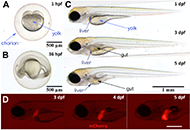 Zebrafish as a model for drug induced liver injury: state of the art and beyondOpen AccessReviewZebrafish as a preclinical drug induced liver injury (DILI) model provides multiple advantages ranging from ease of breeding and maintenance, availability of different strains and transgenic fish am [...] Read more.Gulcin Cakan-Akdogan ... Ozlen KonuPublished: April 26, 2023 Explor Dig Dis. 2023;2:44–55
Zebrafish as a model for drug induced liver injury: state of the art and beyondOpen AccessReviewZebrafish as a preclinical drug induced liver injury (DILI) model provides multiple advantages ranging from ease of breeding and maintenance, availability of different strains and transgenic fish am [...] Read more.Gulcin Cakan-Akdogan ... Ozlen KonuPublished: April 26, 2023 Explor Dig Dis. 2023;2:44–55
DOI: https://doi.org/10.37349/edd.2023.00017
This article belongs to the special issue Drug-induced Liver Injury: From Bench to Clinical Application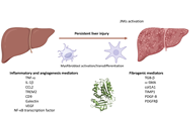 SERPINB3 in fibrogenic chronic liver diseases and primary liver cancersOpen AccessReviewChronic liver diseases (CLDs), which are typically characterized by fibrogenic progression towards liver cirrhosis and related complications eventually leading to organ failure and can also lead to [...] Read more.Patrizia Pontisso, Maurizio ParolaPublished: February 28, 2024 Explor Dig Dis. 2024;3:22–41
SERPINB3 in fibrogenic chronic liver diseases and primary liver cancersOpen AccessReviewChronic liver diseases (CLDs), which are typically characterized by fibrogenic progression towards liver cirrhosis and related complications eventually leading to organ failure and can also lead to [...] Read more.Patrizia Pontisso, Maurizio ParolaPublished: February 28, 2024 Explor Dig Dis. 2024;3:22–41
DOI: https://doi.org/10.37349/edd.2024.00038
This article belongs to the special issue Fibrosis and Hepatobiliary Cancer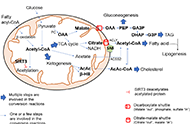 The central role of mitochondrial metabolism in hepatic steatosisOpen AccessReviewMitochondria are present in all mammalian cells except matured red blood cells. Mitochondria consist of several metabolic pathways for glucose, fatty acids, amino acids, and bioenergetic pathways fo [...] Read more.Sanda Win ... Filbert Win Min AungPublished: February 29, 2024 Explor Dig Dis. 2024;3:42–68
The central role of mitochondrial metabolism in hepatic steatosisOpen AccessReviewMitochondria are present in all mammalian cells except matured red blood cells. Mitochondria consist of several metabolic pathways for glucose, fatty acids, amino acids, and bioenergetic pathways fo [...] Read more.Sanda Win ... Filbert Win Min AungPublished: February 29, 2024 Explor Dig Dis. 2024;3:42–68
DOI: https://doi.org/10.37349/edd.2024.00039
This article belongs to the special issue Mitochondria and Lipid Signalling in Liver Diseases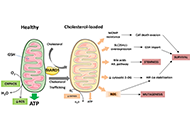 Role of cholesterol homeostasis in MASH-driven hepatocellular carcinoma: not just a neutral fatOpen AccessReviewHepatocellular carcinoma (HCC) is the most common type of liver cancer and its death rate is rising faster than that of any other cancer, while we still lack effective treatments. The increasing inc [...] Read more.Vicent RibasPublished: June 14, 2024 Explor Dig Dis. 2024;3:203–225
Role of cholesterol homeostasis in MASH-driven hepatocellular carcinoma: not just a neutral fatOpen AccessReviewHepatocellular carcinoma (HCC) is the most common type of liver cancer and its death rate is rising faster than that of any other cancer, while we still lack effective treatments. The increasing inc [...] Read more.Vicent RibasPublished: June 14, 2024 Explor Dig Dis. 2024;3:203–225
DOI: https://doi.org/10.37349/edd.2024.00048
This article belongs to the special issue Mitochondria and Lipid Signalling in Liver Diseases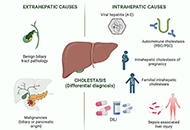 Drug-induced cholestasis: causative agents and challenges in diagnosis and managementOpen AccessReviewDrug-induced liver injury (DILI) is an adverse reaction to drugs and other xenobiotics that can have serious consequences and jeopardise progress in pharmacological therapy. While DILI is predominan [...] Read more.Jose M. Pinazo-Bandera ... Miren García-CortésPublished: September 18, 2023 Explor Dig Dis. 2023;2:202–222
Drug-induced cholestasis: causative agents and challenges in diagnosis and managementOpen AccessReviewDrug-induced liver injury (DILI) is an adverse reaction to drugs and other xenobiotics that can have serious consequences and jeopardise progress in pharmacological therapy. While DILI is predominan [...] Read more.Jose M. Pinazo-Bandera ... Miren García-CortésPublished: September 18, 2023 Explor Dig Dis. 2023;2:202–222
DOI: https://doi.org/10.37349/edd.2023.00027
This article belongs to the special issue CHOLESTASIS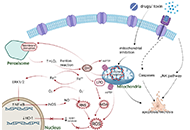 Role of oxidative stress and endoplasmic reticulum stress in drug-induced liver injuryOpen AccessReviewThe pathogenesis of drug-induced liver injury (DILI) is still in an early stage of research. However, investigators have shown that both oxidative stress and endoplasmic reticulum (ER) stress play a [...] Read more.Hanghang Wu ... Francisco Javier CuberoPublished: June 28, 2023 Explor Dig Dis. 2023;2:83–99
Role of oxidative stress and endoplasmic reticulum stress in drug-induced liver injuryOpen AccessReviewThe pathogenesis of drug-induced liver injury (DILI) is still in an early stage of research. However, investigators have shown that both oxidative stress and endoplasmic reticulum (ER) stress play a [...] Read more.Hanghang Wu ... Francisco Javier CuberoPublished: June 28, 2023 Explor Dig Dis. 2023;2:83–99
DOI: https://doi.org/10.37349/edd.2023.00020
This article belongs to the special issue Drug-induced Liver Injury: From Bench to Clinical Application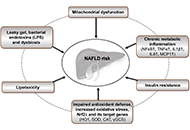 Ultra-processed food consumption and the risk of non-alcoholic fatty liver disease—What are the proposed mechanisms?Open AccessReviewA high consumption of ultra-processed food (UPF) is a hallmark of Western diets that has been related to increased risk of non-communicable diseases. As an underlying mechanism, UPF may promote non- [...] Read more.Franziska A. Hägele ... Anja Bosy-WestphalPublished: August 24, 2023 Explor Dig Dis. 2023;2:133–148
Ultra-processed food consumption and the risk of non-alcoholic fatty liver disease—What are the proposed mechanisms?Open AccessReviewA high consumption of ultra-processed food (UPF) is a hallmark of Western diets that has been related to increased risk of non-communicable diseases. As an underlying mechanism, UPF may promote non- [...] Read more.Franziska A. Hägele ... Anja Bosy-WestphalPublished: August 24, 2023 Explor Dig Dis. 2023;2:133–148
DOI: https://doi.org/10.37349/edd.2023.00023 Fructose, a trigger of metabolic diseases?—a narrative reviewOpen AccessReviewWorldwide the number of individuals being overweight or obese has dramatically increased during the last decades, which is also associated with a similar dramatic increase of individuals afflicted w [...] Read more.Anja Baumann ... Ina BergheimPublished: August 29, 2022 Explor Dig Dis. 2022;1:51–71
Fructose, a trigger of metabolic diseases?—a narrative reviewOpen AccessReviewWorldwide the number of individuals being overweight or obese has dramatically increased during the last decades, which is also associated with a similar dramatic increase of individuals afflicted w [...] Read more.Anja Baumann ... Ina BergheimPublished: August 29, 2022 Explor Dig Dis. 2022;1:51–71
DOI: https://doi.org/10.37349/edd.2022.00005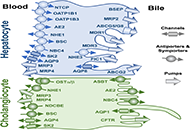 Etiopathogenesis and pathophysiology of cholestasisOpen AccessReviewNormal hepatobiliary function depends on an adequate bile flow from the liver through the biliary tree to the gallbladder, where bile is stored and concentrated, and from the gallbladder to the duod [...] Read more.Maitane Asensio ... Jose J. G. MarinPublished: October 31, 2022 Explor Dig Dis. 2022;1:97–117
Etiopathogenesis and pathophysiology of cholestasisOpen AccessReviewNormal hepatobiliary function depends on an adequate bile flow from the liver through the biliary tree to the gallbladder, where bile is stored and concentrated, and from the gallbladder to the duod [...] Read more.Maitane Asensio ... Jose J. G. MarinPublished: October 31, 2022 Explor Dig Dis. 2022;1:97–117
DOI: https://doi.org/10.37349/edd.2022.00008
This article belongs to the special issue CHOLESTASIS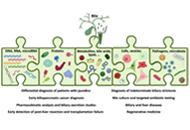 Bile as a liquid biopsy matrix: potential applications and limitationsOpen AccessReviewHunting for tumoral material in body fluids, traditionally in blood, the so-called liquid biopsy is set to revolutionize the diagnosis and management of oncological patients. However, other biofluid [...] Read more.Maria Arechederra ... Carmen BerasainPublished: February 04, 2024 Explor Dig Dis. 2024;3:5–21
Bile as a liquid biopsy matrix: potential applications and limitationsOpen AccessReviewHunting for tumoral material in body fluids, traditionally in blood, the so-called liquid biopsy is set to revolutionize the diagnosis and management of oncological patients. However, other biofluid [...] Read more.Maria Arechederra ... Carmen BerasainPublished: February 04, 2024 Explor Dig Dis. 2024;3:5–21
DOI: https://doi.org/10.37349/edd.2024.00037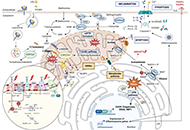 Impact of mitochondrial lipid alterations on liver disease mechanisms and progressionOpen AccessReviewLipids are intricate biomolecules responsible for the building up of biological membranes. Besides this structural function, they also display crucial roles in signaling, acting as second messengers [...] Read more.Laura Fàbrega ... Carmen Garcia-RuizPublished: September 10, 2024 Explor Dig Dis. 2024;3:382–413
Impact of mitochondrial lipid alterations on liver disease mechanisms and progressionOpen AccessReviewLipids are intricate biomolecules responsible for the building up of biological membranes. Besides this structural function, they also display crucial roles in signaling, acting as second messengers [...] Read more.Laura Fàbrega ... Carmen Garcia-RuizPublished: September 10, 2024 Explor Dig Dis. 2024;3:382–413
DOI: https://doi.org/10.37349/edd.2024.00057
This article belongs to the special issue Mitochondria and Lipid Signalling in Liver Diseases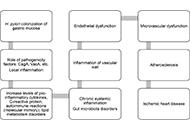 Helicobacter pylori infection and metabolic syndromeOpen AccessReviewThe formation of metabolic changes is based on many factors. In particular, the infectious theory of the development of metabolic “breakdowns” has not lost its relevance. In this regard, many sc [...] Read more.Natalia V. Baryshnikova ... Alexander N. SuvorovPublished: September 10, 2024 Explor Dig Dis. 2024;3:414–427
Helicobacter pylori infection and metabolic syndromeOpen AccessReviewThe formation of metabolic changes is based on many factors. In particular, the infectious theory of the development of metabolic “breakdowns” has not lost its relevance. In this regard, many sc [...] Read more.Natalia V. Baryshnikova ... Alexander N. SuvorovPublished: September 10, 2024 Explor Dig Dis. 2024;3:414–427
DOI: https://doi.org/10.37349/edd.2024.00058
This article belongs to the special issue Helicobacter Pylori and Infection: Genomics, Diagnosis, Pathogenesis, Antibiotic Resistance, Microbiota, Cancer, Prevention and Therapeutics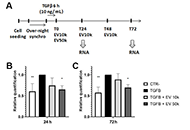 Human liver stem cell-derived extracellular vesicles modulate long non-coding RNA expression profile in an in vivo model of non-alcoholic steatohepatitisOpen AccessOriginal ArticleAim: Modifications in long non-coding RNA (lncRNA) expression are associated with inflammation and fibrosis in chronic liver diseases. It has been recently demonstrated that human liver stem cell [...] Read more.Giulia Chiabotto ... Stefania BrunoPublished: August 30, 2023 Explor Dig Dis. 2023;2:172–187
Human liver stem cell-derived extracellular vesicles modulate long non-coding RNA expression profile in an in vivo model of non-alcoholic steatohepatitisOpen AccessOriginal ArticleAim: Modifications in long non-coding RNA (lncRNA) expression are associated with inflammation and fibrosis in chronic liver diseases. It has been recently demonstrated that human liver stem cell [...] Read more.Giulia Chiabotto ... Stefania BrunoPublished: August 30, 2023 Explor Dig Dis. 2023;2:172–187
DOI: https://doi.org/10.37349/edd.2023.00025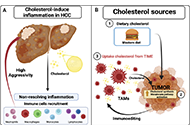 Tumor immune microenvironment modulation by cholesterol in hepatocellular carcinomaOpen AccessReviewHepatocellular carcinoma (HCC) is considered one of the most aggressive tumors worldwide. The consumption of lipid-enriched diets, mainly high cholesterol, induces oxidative stress and chronic infla [...] Read more.Alejandro Escobedo-Calvario ... María Concepción Gutiérrez-RuízPublished: July 29, 2022 Explor Dig Dis. 2022;1:21–39
Tumor immune microenvironment modulation by cholesterol in hepatocellular carcinomaOpen AccessReviewHepatocellular carcinoma (HCC) is considered one of the most aggressive tumors worldwide. The consumption of lipid-enriched diets, mainly high cholesterol, induces oxidative stress and chronic infla [...] Read more.Alejandro Escobedo-Calvario ... María Concepción Gutiérrez-RuízPublished: July 29, 2022 Explor Dig Dis. 2022;1:21–39
DOI: https://doi.org/10.37349/edd.2022.00003 -
